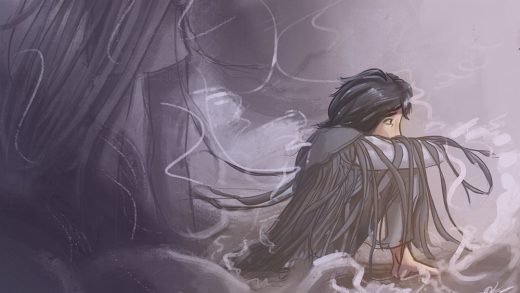The weight of the stars, he called it, that elusive, ineffable thought that burdened him so. Eccentric, they called him in turn, dismissing that unorthodox shell of self-conscious inelegance as another man, who, just isn’t quite right in the head.
“And so it goes,” he thought. “This peculiar existence, linear in nature, that we call life.” Or at least, he thought that he thought, learning all too late after looking at his friends’ bemused faces that he’d spoken out loud. Again.
Ah, well, that’s just what it usually felt like to be near him. He wouldn’t admit this to anyone, not that anyone with a jot of sense would understand anyway — often, the best they could manage was to conspicuously nod their heads in sympathy — but he struggled to belong. It was almost as if he was an alien in a world that didn’t care about passing him by; a world that neither understood his quirkiness nor bothered to acknowledge it.
It made for a painful experience, though when you happen to find yourself pushing past a handful of decades, you begin to realize that not being understood doesn’t even bother you nearly as much as you thought it did. At some point, it simply ceases to matter. What never fails to matter, however, is understanding everything to the very marrow of its being and not having that perception reciprocated.
That’s a lie, of course. He knew the truth, even if he didn’t wish to admit that not everyone was as bull-headed as he was. In a world where contemplation was as painful a notion as self-fulfillment was harrowing, one soon learned to leave it all behind and seek out safer pastures of thought. And the trick was simple enough; you just had to stop thinking.
“I can’t go on like this!” He exclaimed once, startling everyone around the table. They were playing a game of cards, so the outburst would look like nothing out of the ordinary to a passerby familiar with such violent horseplay among a close-knit group of friends. His friends knew what they didn’t, that this almost certainly had nothing to do with the game being played, and not just for the fact that he was winning.
“But we have them,” his partner, sitting in front of him and smirking at their opponents, gleefully retorts. “It’s almost over.”
At first, he doesn’t reply. He doesn’t even look back at them from his brooding reverie. A few moments pass, and then he suddenly turns around, locks eyes with the person who had spoken. “Over?” He seems to almost taste the word in his mouth. “Over, you say? And what makes you think that?” What indeed? And shaking his head, as if in pity, he walks out of the room without elaborating any further.
The days pass, as they tend to do, and no one hears anything about him or what he’s been up to. They know better than to ask, and they certainly wouldn’t like the answer if they did. It was just how he was, and there was that.
“What are all of these stacks of paper, anyway?” asked his colleague once, visiting his apartment after he didn’t show up for work for five consecutive days. Yes, many found that revelation surprising as well. He thought it was deeply amusing, hilarious even, that they assumed anyone, even a person as eccentric as he was, would be able to go without a job. But then, he always wished that he could.
He found working enjoyable, all things considered. In fact, it wasn’t putting the hours in that threw him off. He just didn’t like to think of what he loved doing as work, because there was a deeply ingrained human stubbornness that refused to find any value in material pursuits.
“Hey, did you hear me?” The colleague demands again. “I said what are all these stuff scattered around here?”
“My writing.” A simple, to-the-point answer.
There were dozens of stacks, each containing hundreds of pages of prose. The colleague nods appreciatively. He probably thinks that his overwhelming success as a writer — a copywriter, to be precise — comes from all of this practice. He is, unfortunately, like all the rest of them, an idiot.
He writes what he knows to work, and he’s certainly prolific by the standards, but you couldn’t find anything remotely similar between his published work and the stuff in those pages. Oh, there have been lapses here and there. Sometimes the temptation is too powerful to resist, and the words of his heart end up spilling into that monotonous, dreary prose that everyone apparently finds so desirable.
When it does, he garners even more acclaim, but for some reason, he fails to make the connection. Or perhaps he’s simply given up on the hope altogether. You can only get lucky so many times. It’s not as if people have suddenly started to understand what goes on in the deepest recesses of his soul.
Content with his distasteful prying, the colleague prepares to leave. “Well, we certainly could use a little help if you’re feeling better. The team doesn’t know how to proceed, and we have that big contract…” The words turn to a fuzzy blur again. He’s stopped listening. Fortunately, a nod and a wan smile are all it takes to send the colleague away, bringing him peace for at least a little while.
There’s another truth that he hopes people will never figure out. They always assume that when he phases out, he’s having another one of those peculiar thoughts, or coming up with something interesting to pen down. They don’t know — and hopefully will never know — how every hour is a struggle to hold on to sanity; that even he doesn’t know what the right thing to do is. There are always two forces fighting inside his mind. One seeks acceptance, while the other is enthralled with divinity. One is disillusioned by the poet, while the other yearns for it in his soul.
And so it goes, this peculiar existence, linear in nature, that we call life.




